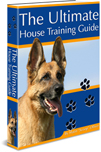Best Way To Train Your Dog Effectively
 Your dog is always learning. The problem is - how do you get your dog to learn good habits and NOT bad habits? Dogs understand things very differently than us humans, so frequently when you are training your dog (or even when you think you are NOT) you are actually making behavior problems worse!
Your dog is always learning. The problem is - how do you get your dog to learn good habits and NOT bad habits? Dogs understand things very differently than us humans, so frequently when you are training your dog (or even when you think you are NOT) you are actually making behavior problems worse! Only ask your dog to do something if you know you can follow through with the command. If you tell your dog to sit and he does not do it, you must impose a consequence. If you don't, your pet will begin to view your instructions as something they can choose to do.
Be sure to spend time with your dog and teach him things every day. When he is a puppy, teach him his name, how to come when called and show him the proper place for toileting. When he gets a little older, begin gentle leash training. When he is six months old, join an obedience class so that he can learn how to behave in public and get some formal training.
Dogs who are afraid of thunderstorms or have some other specific phobia can be calmed with kava-kava. This is a natural, herbal supplement that has a calming effect and acts as a muscle relaxer. Consult your vet about the amount of kava-kava that is safe for your dog. Generally speaking, a large dog can take a single 325 mg capsule.
Be consistent and clear with your dog when training and as far as what you expect. You should be consistent in the words used for commands and the rules for appropriate behavior. Being consistent will help keep your dog being becoming confused and possibly resorting to unwanted behaviors.
A great dog training tip is to always use your dog's name in a positive manner. By doing this, you will ensure a higher success rate of good behavior because your dog will associate its name with good behavior. Therefore, you should never use your dog's name in a negative manner.
Realize an older dog's limitations. An older dog will never be able to be trained perfectly: they all have little quirks that you should learn to embrace! Remember that if you adopt an older dog, they may be very set in their ways. While it may be possible to teach them new habits, sometimes it's best to concentrate on the negative things that you can alter, and learn to live with the other things.
When training your dog, be competent! Your dog wants to know that you are in charge and that you know what you are doing. If you are inconsistent, anxious, irritable, angry, or in any way unstable while training your dog, you will not succeed. You must be calm, consistent, and competent. If you don't know about dog training, it is a very good idea to learn from books, videos and people who know before you ever get a dog!
Learn to read how your dog is feeling. By studying your pet's body language, you'll be able to guess whether it is feeling nervous, agitated, aggressive, or calm. If you can predict when a dog is about to behave badly, you can remove it from a bad situation before a problem develops.
Dogs often initiate play by using their mouths. You can teach them that mouthing people is not an acceptable behavior. If your dog mouths you (that is, places a part of your body in his mouth), simply stop all play. Turn your back away from your dog and give him a "time out" of sorts. He will soon learn that mouthing means that he will not get to play, and he should eventually stop engaging in this behavior.
To break your dog of bad habits such as jumping, the best technique is to ignore him, for just a short period! Dogs don't really understand yelling in a situation like that. But if you turn your back and avoid further interaction, he'll get the idea that he's done something that breaks contact with you and dogs want to be our friends!
Try these simple techniques yourself in your next training session with your dog. Try as few or as many of the tips as you want. Once you have practiced and then mastered these strategies with your dog, he will become the well behaved member of society you dreamed he would be
Stubborn Dog?
Fix Stubborn - Get The Ultimate House Training Guide

0 comments: